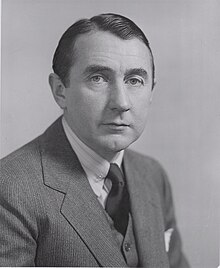William Harding Jackson
| Bill Jackson | |
|---|---|
 |
|
| National Security Advisor | |
|
In office September 1, 1956 – January 7, 1957 |
|
| President | Dwight D. Eisenhower |
| Preceded by | Dillon Anderson |
| Succeeded by | Robert Cutler |
| Deputy Director of Central Intelligence | |
|
In office October 7, 1950 – August 3, 1951 |
|
| President | Harry Truman |
| Preceded by | Edwin K. Wright |
| Succeeded by | Allen Dulles |
| Personal details | |
| Born |
March 25, 1901 Belle Meade, Tennessee, U.S. |
| Died |
September 28, 1971 (aged 70) Tucson, Arizona, U.S. |
| Political party | Republican |
| Spouse(s) | Elizabeth Lyman Rice (1929–1946) Mary Keating (1951–1965) Irma Hanley |
| Children | 3 (including Bruce) |
| Education |
Princeton University (BA) Harvard University (LLB) |
William Harding "Wild Bill" Jackson Jr. (March 25, 1901 – September 28, 1971) was a U.S. civilian administrator, New York lawyer, and investment banker who served as Deputy Director of the Central Intelligence Agency. Jackson also served briefly under President Dwight D. Eisenhower as United States National Security Adviser in 1956 while in his role as Special Assistant for National Security Affairs from 1956 to 1957.
William Harding Jackson was born on March 25, 1901 on the Belle Meade Plantation, in Belle Meade, Tennessee near Nashville, Tennessee. His father of the same name was William Harding Jackson (1874-1903), and his mother, Anne Davis Richardson (1877-1954) (later remarried to Maxwell Stevenson of Hempstead, New York).
Jackson attended the Fay School in Boston and St. Mark's School, an Episcopal Preparatory school in Southborough, Massachusetts. He received his undergraduate Bachelor of Arts degree (B.A.) from Princeton University (1924) and his LL.B. from Harvard Law School (1928).
In 1928, Jackson joined the New York law firm of Cadwalader, Wickersham & Taft. In 1929 he became an Associate of Beekman & Bogue. Following the stock market crash of 1929, Jackson moved to the business and financial interest law firm of Carter, Ledyard & Milburn, where he became a full partner in 1934.
During World War II, Jackson served in the United States Army (from 6 March 1942 – 7 July 1945) as an intelligence officer where he graduated from the Army-Air Force (USAAF) Air Combat Intelligence School at Harrisburg PA. He was assigned as an A-2 Assistant Intelligence officer, HQ 1st Bomber Command at 90 Church St in New York (close to his law office), which immediately became the USAAF Anti-Submarine Command. William Harding Jackson was the principal author (along with investment banker Alexander Standish and Harold B. Ingersoll) of the USAAF Bay of Biscay Intelligence Estimate, calling for the attack on Nazi U-boats at their source on the coast of France. This was a significant turning point for the Battle of the Atlantic. After graduation from Harrisburg in June 1942 Jackson was promoted to Major and brought into the War Department by Sec. Henry L. Stimson where he became General Staff - Chief of Secret Intelligence reporting to Gen. George C. Marshall from the European Theater of Operations (ETO) at COSSAC headquarters - with the 'cover' title Chief of G-2 intelligence for 1st Army Group (FUSAG). After training on the Enigma codes at Bletchley Park UK he became the senior ULTRA SCIU team leader for all US armies in the ETO.
...
Wikipedia
